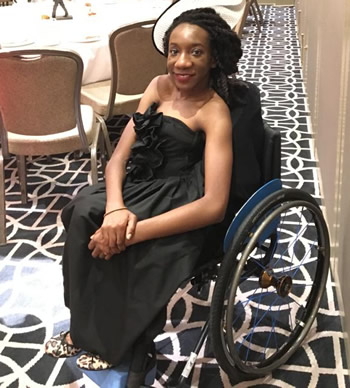By Corbin Black
 Three months ago, Dr. Samantha Jumbe began her career as a clinical scientist at the National Health Service Trust in Salisbury, England, where she works to diagnose and monitor hematological malignancies and solid tumors using a variety of cellular and molecular techniques. Despite being early in her career, Dr. Jumbe has already accrued a wealth of experience both on and off the bench. She completed a Bachelor of Science degree in Applied Biomedical Sciences at the University of West England, where she graduated with First Class Honours. She would then remain at this University for graduate school, where she joined Dr. Michael Landomery’s lab and recently earned her PhD.
Three months ago, Dr. Samantha Jumbe began her career as a clinical scientist at the National Health Service Trust in Salisbury, England, where she works to diagnose and monitor hematological malignancies and solid tumors using a variety of cellular and molecular techniques. Despite being early in her career, Dr. Jumbe has already accrued a wealth of experience both on and off the bench. She completed a Bachelor of Science degree in Applied Biomedical Sciences at the University of West England, where she graduated with First Class Honours. She would then remain at this University for graduate school, where she joined Dr. Michael Landomery’s lab and recently earned her PhD.
During her graduate work, Dr. Jumbe studied the transcription factor ERG, which regulates the expression of several oncogenes associated with prostrate cancer and leukemia. Alternative splicing of ERG pre-mRNA allows for several different proteoforms, and the literature had suggested that inclusion of one exon (called exon 7b) might lead to oncogenic behavior. To test this hypothesis, Dr. Jumbe studied the effect of alternative splicing of ERG on cancer by designing an antisense oligonucleotide (ASO) that caused skipping of ERG exon 7b during pre-mRNA splicing. Her studies indicated that ERG exon 7b skipping decreased cancer cell proliferation, reduced cancer cell invasion, and increased cell apoptosis. Dr. Jumbe believes that her work has provided important preliminary evidence that ASOs can be an effective component of treatment for certain cancers. She explained, “although targeting splice isoforms in cancer may not provide a correction of the underlying genetic abnormalities, my work has shown that the approach can help to further reduce disease burden when used in conjunction with existing therapies.”
“I had great female science role models… Each one different, and each one reminding me that being different in science is important.”
Throughout her PhD, Dr. Jumbe mentored and taught undergraduate students. “Taking them through the science in more detail, telling them about postgraduate studies and explaining my research were things I did every week. Over time, I became something of a mentor to specific students, some of whom are now pursuing post-graduate degrees.” Building upon this experience, Dr. Jumbe had this piece of advice for trainees: “create opportunities for yourself.”
Although graduate work is wrought with challenges, Dr. Jumbe had more to overcome than most, being a “triple threat minority: a black woman in a wheelchair in science.” Admittedly her background and experiences have made Dr. Jumbe unique, but as she explained, “the main challenge was not practicalities of doing my science; it was of perception.” When asked how she dealt with social stigmas, her response was inspirational: “sheer, stubborn-headed determination and resourcefulness.” These traits were encouraged and reinforced by excellent mentors, many of whom were themselves successful women in STEM fields. She elaborated, “I had great female role models throughout my scientific training, from my high school biology teacher (who herself was a PhD graduate) to my undergraduate supervisor. Each one different, and each one reminding me that being different in science is important.”
Dr. Jumbe has enjoyed being a member of the RNA community throughout her graduate career. “The RNA world is diverse with the best people working in different disciplines, and the RNA Society acts as a bridge to these disciplines and provides a marvelous collaborative platform.” Her most memorable story comes from the 2017 RNA Society Meeting in Prague, where Professor Adrian Krainer presented his work using ASOs to treat spinal muscular atrophy. “I have never had such an emotional and inspiring experience at a scientific conference, and it is something I will always remember. When things are going slow with my work and I am in need of motivation, I think back to that day.”
Dr. Jumbe doesn’t discriminate between RNA, and declares, “I love all RNA equally!” She also takes advantage of social media: you can find her on LinkedIn, by email at [email protected], or look for her at the next RNA meeting in Krakow, June 11-16, 2019, where you two could “have a natter about science.”
